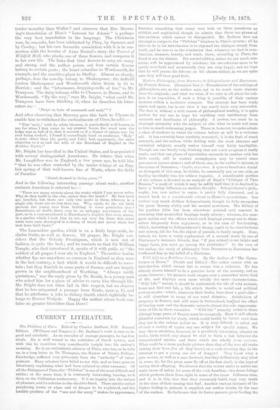CURRENT LITERATURE.
The Philebus of Plato. Edited by Charles Badham, D,D. Second Edition. (Williams and Norgate.)—Dr. Badham's work is sure to be good and scholarly. As an °mender of corrupt passages, he has few rivals. He is well versed in the subtleties of Greek syntax, and with this he combines very considerable insight into his author's meaning. He is an enthusiestic admirer of Plato, who has, as be tells us, in a long letter to Dr. Thompson, the Master of Trinity College, Cambridge, suffered very grievously from the " audacity " of inter- polators. Many scholars have failed to see this, and so have gone on laboriously explaining what had been reduced to utter nonsense. Of all the Dialogues of Plato, the "Philobus" is one of the most difficult and subtle; at the same time, it is extremely interesting, bearing, as it does, on the Utilitarian controversy. It is an inquiry into the nature of pleasure, and its relation to the absolute Good. There are the rather perplexing terms ,rb ripas and ?di dreipoy to be explained, and the terrible problem of the "one and the many" makes its appearance, Socrates remarking that many men look on these paradoxes as childish and sophistical, though he admits that there are phases of this problem which cannot be disregarded. Mr. Baal= doom not attempt to assign to the "Philebus" its place in Plato's system; all he tries to do in his introduction is to expound the dialogue simply from itself, and he corn es to the conclusion that wherever we find in com- bination, measure, beauty, and truth, there, according to Plato, the Good is not far distant. His second edition, unless we are much mis- taken, will be appreciated by scholars ; his emendations seem to be rarely over-bold, and occasionally they are very happy, and we hope that he will pursue his labours on his chosen author, as we are quite sure they will boar good fruit.


































 Previous page
Previous page